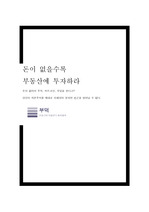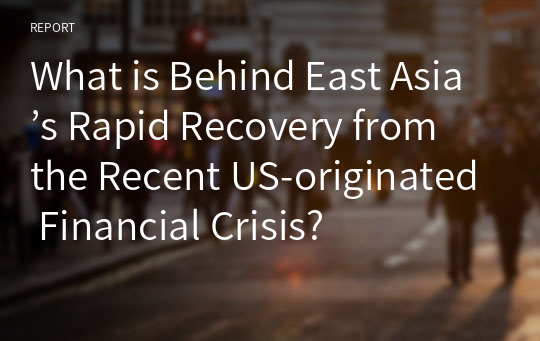What is Behind East Asia’s Rapid Recovery from the Recent US-originated Financial Crisis?
*동*
다운로드
장바구니
소개글
1. 이 글은 동아시아 국가들이 최근 경제 위기에서 다른 지역 국가들에 비해 빠르게 회복할 수 있었던 원인을 크게 2가지의 국내적 요인과 3가지 국제적 요인으로 나누어 탐구하는 영어 소논문 입니다.2. 이 글은 SKY 대학 중 한 곳에서 A를 받은 레포트 입니다.
목차
1. Introduction2. The Shortcomings of Existing Literature
3. The Mechanism of Finance and Economic Recovery
4. A Holdback on Financial Liberalization in East Asia
1) Domestic Cause 1- The Learning Effect on Policymakers
2) Domestic Cause 2- Asian Governments’ Strong Commanding Power
3) International Cause 1 – Erosion of US Hegemony and Rise of China
4) International Cause 2 – Influence of Global Finance
5) International Cause 3 – Difficulty of Monitoring Financial Situation
5. Concluding Remark
6. Bibliography
본문내용
Then, what allowed these favorable conditions in the first place? Was it mere coincidence that East Asian countries had been preserving big exchange reserves and sustaining low interest rates when a devastating global financial crisis was coming? Or, are East Asian countries ‘by nature’ more resilient to a financial crisis? If that is true, what about the 1997 Asian financial crisis? Didn’t many Asian countries almost go to the verge of national bankruptcy? If so, was it the experience of a devastating crisis that determined a unique ‘Asian’ attitude towards financial market? What kind of change had occurred in the ‘Asian’ approach to international finance? And what lay at the bottom of that change? In this paper, we argue that a common holdback of financial liberalization throughout this economic region best account for the recent East Asia’s successful recovery.참고 자료
Abiad, A & Mody, A. (2005, March). What Shakes It? What Shapes It?. The American Economic Review, 95(1), 66-88. Retrieved November 23, 2009 fromhttp://www.jstor.org/stable/4132671
Bae, G. C. (1988). ‘Nixon Doctrine and Emergency of East Asian Authoritarian System: Comparative Analysis of South Korea, the Philippines, and Indonesia. The Korean Political Science Association, 22 (2), 321-338
Bergsten, C. F. (2007). China and Economic Integration in East Asia: Implications for the United States. Policy Briefs in International Economics. Washington D.C.: the Peterson Institute for International Economics. Retrieved November 28, 2009 from
http://www.iie.com/publications/pb/pb07-3.pdf
Cotton, J. (1991). The Limits to Liberalization in Industrializing Asia: Three Views of the State. Pacific Affairs, 64(3), 311-327 Retrieved November 23, 2009 from
http://www.jstor.org/stable/2759466
Demetriades, P. O. & Fattouh, B. A. (1999). The South Korean Financial Crisis: Competing Explanations and Policy Lessons for Financial Liberalization. International Affairs, 75(4), 779-792. Retrieved November 23, 2009 from
http://www.jstor.org/stable/2626278
Economist. (2009, June 27). Shopaholics Wanted. The Economist, 79.
IMF. (2009, Oct). Regional Economic Outlook: Asia and Pacific. (World economic and financial surveys, 0258-7440). Washington D.C.: International Monetary Fund. Retrieved November 23, 2009 from
https://www.imf.org/external/pubs/ft/reo/2009/apd/eng/areo1009.pdf
Key, S. J. (1999, Jan). Trade Liberalization and Prudential Regulation: The International Framework for Financial Services. International Affairs, 75(1), 61-75. Retrieved November 23, 2009 from http://www.jstor.org/stable/2625463
Kim, B. H. (2004). ‘그해 겨울은 뜨거웠다 :IMF 극복 `금 모아 수출하자’. 서해문집.
Kim, I. K. (1999). ‘동아시아 발전 모델과 한국’. 政正 12(`99.12) pp.157-186.
Korea Financial Supervisory Service. (2007). ‘중국의 금융감독제도’. 금융감독원.
Kuk, M. H. (2007). ‘동아시아 발전과 아시아적 가치: 한국의 사례를 중심으로’. 東洋社會思想. 제15집 (2007년 5월) pp.183-221
Kurlantzick, J. (2007). Pax Asia-Pacifica: Asia’s Emerging Identity and Implications for U.S. Policy. The Washington Quarterly. Washington D.C.: The Center for Strategic and International Studies and the Massachusetts Institute of Technology. 30(3), 67-77. Retrieved November 28, 2009 from
http://www.pacificcouncil.org/pdfs/07summer_kurlantzick.pdf
Lee, S. H. (2000). ‘동아시아 권위주의 연구 Ⅰ : 싱가포르 권위주의체제의 정치경제학’. 담론201 9(2000.12) pp.20-50.
Lim, H. B. (2008). ‘건국 이후 60년간 한국 국가성격의 변화: 반공주의, 발전주의, 시장권위주의, 신자유주의, 그리고 신유목주의’. 서울대 한국정치연구소.
Simmons, B. S & Elkins, Z. (2004, Feb). The Globalization of Liberalization: Policy Diffusion in the International Political Economy. The American Political Science Review, 98(1), 171-189. Retrieved November 23, 2009 from
http://www.jstor.org/stable/4145304
Stiglitz, J. E. (2002, Jan). Capital Market Liberalization and Exchange Rate Regimes: Risk without Reward. Annals of the American Academy of Political and Social Science, 579, 219-248. Retrieved November 23, 2009 from
http://www.jstor.org/stable/1049792
Thomas, A. (2009, March 11). Financial Crises and Emerging Market Trade. Washington, DC: the International Monetary Fund. Retrieved November 23, 2009 from http://www.imf.org/external/pubs/ft/spn/2009/spn0904.pdf
Walter, A. (2008). Governing Finance: East Asia’s Adoption of International Standards. Ithaca, NY: Cornell University Press.
Way, C. R. (2005). Political Insecurity and the Diffusion of Financial Market Regulation. Annals of the American Academy of Political and Social Science, 598, 125-144. Retrieved November 23, 2009 from http://www.jstor.org/stable/25046083






























